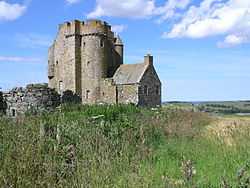Robin de La Lanne-Mirrlees

Robin Ian Evelyn Milne Stuart de la Lanne-Mirrlees (13 January 1925 – 23 June 2012) was an author and former officer of arms at the College of Arms in London.
Biography
He was born as Robin Ian Evelyn Grinnell-Milne in 1925. His father was Duncan Grinnell-Milne, and his stepaunt was the author Hope Mirrlees.[1] He was a godson of the 11th Duke of Argyll. He was educated at the English School of Cairo, and also in Paris. He also attended Merton College, Oxford. He undertook military service, rising to the rank of captain in the Royal Artillery. His heraldic career began on 17 May 1952 when he was appointed Rouge Dragon Pursuivant of Arms in Ordinary.[2] Later that year his name was changed to that listed above.[3]
In 1958 he adopted by deed poll the name of Robin Ian Evelyn Milne Stuart le Comte de La Lanne-Mirrlees.[4][5] He would hold this post of Rouge Dragon until December 1962, when he was promoted to the office of Richmond Herald of Arms in Ordinary.[6] He retired from this post in 1967.[7] During his time at the College of Arms, Milne Stuart de la Lanne-Mirrlees was perhaps best known for his correspondence with Ian Fleming. Fleming was doing research for his book On Her Majesty’s Secret Service.
In 1962 Count Mirrlees purchased the islands of Great Bernera, Little Bernera, and Eilean Chearstaidh, in the Outer Hebrides of Scotland. The Count lived on Great Bernera until his death, though he sold the uninhabited Eilean Chearstaidh in 1990.
In 1971 he bought and partly restored Inchdrewer Castle, near Banff in Aberdeenshire.[8]
In 1975, Milne Stuart de la Lanne-Mirrlees was recognized by the Lord Lyon King of Arms as Baron of Inchdrewer and Laird of Bernera.[9] He was also a Knight of Honour and Devotion of the Sovereign Military Hospitaller Order of St. John of Jerusalem of Rhodes and of Malta. In 1992, by a further deed poll, he adopted the name Robin Ian Evelyn Milne Stuart le Prince de la Lanne-Mirrlees.[10] In 2005, he began to assert his claim to a princely title bestowed on him by King Peter II of Yugoslavia.
After several years of ill health, he died at a nursing home in Stornoway, Scotland on 23 June 2012.
Influence on James Bond
Count Robin played a large role in the development of the James Bond character. A Scottish aristocrat well known for wooing beautiful women, he worked with Ian Fleming on his book On Her Majesty's Secret Service, and was the main inspiration for the characteristics of James Bond. In the story, James Bond's cover as genealogist Sir Hilary Bray was based on the Count's current position as heraldic researcher at the College of Arms in London.[11]
See also
References
- ↑ Obituary Count Robin de la Lanne-Mirrlees
- ↑ The London Gazette: no. 39549. p. 2814. 23 May 1952. Retrieved 2008-01-08.
- ↑ The London Gazette: no. 39676. p. 5554. 21 October 1952. Retrieved 2008-01-08.
- ↑ The London Gazette: no. 41584. p. 7927. 26 December 1958. Retrieved 2008-01-08.
- ↑ The London Gazette: no. 41629. p. 992. 10 February 1959. Retrieved 2008-01-08.
- ↑ The London Gazette: no. 42854. p. 9648. 11 December 1962. Retrieved 2008-01-08.
- ↑ The London Gazette: no. 44298. p. 4677. 27 April 1967. Retrieved 2008-01-08.
- ↑ "Inchdrewer Castle, Nr Alvah". Buildings at Risk Register. Royal Commission on the Ancient and Historical Monuments of Scotland. Retrieved 14 September 2012.
- ↑ The Edinburgh Gazette: no. 19840. p. 331. 16 March 1976. Retrieved 2008-01-08.
- ↑ The London Gazette: no. 52923. p. 8481. 15 May 1992. Retrieved 2008-01-08.
- ↑ Murdo Maclean and Graham Smith (11 July 2012). "'Dashing' Scottish aristocrat whose bed-hopping ways were inspiration for James Bond dies, aged 87". dailymail.co.uk. Retrieved 11 July 2012.
External links
| Heraldic offices | ||
|---|---|---|
| Preceded by Michael Roger Trappes-Lomax |
Rouge Dragon Pursuivant of Arms 1952 – 1962 |
Succeeded by Conrad Marshall John Fisher Swan |
| Preceded by Anthony Richard Wagner |
Richmond Herald of Arms 1962 – 1967 |
Succeeded by John Brooke-Little |